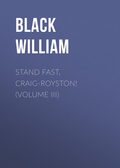
Black William
In Silk Attire: A Novel
"Your affectionate brother,
"FRED. v. SCHÖNSTEIN."
Frederick von Schönstein should have seen his brother's face when that letter arrived. It was not an expressive face; but on this occasion there were several emotions clearly visible in it, and they were not of a mournful kind. Indeed, John Hubbard looked upon this letter as worth thousands of pounds to him. It was the key of the position. He showed it to his wife.
"What a brute!" she said, "to think of harming the poor girl. I have never liked your brother, my dear, since he began to try to entrap this girl, but now I am beginning to hate him."
And doubtless Mrs. Hubbard imagined, quite honestly, that it was merely compassion for her charming and unprotected governess which provoked her mild wrath and contempt.
"Fred's a fool, my dear, or he wouldn't have written that letter."
"Why?"
"Don't you see?" observed the husband, proud of his superior masculine perspicacity; "whenever he seeks to interfere with her, or with our relations towards her, we have only to show her this letter, and I think that will considerably cook his goose."
It was not often that the meek and proper brother of the Count was tempted into slang; but on this great occasion, when a lucky chance had delivered everything into his hands, he could not forbear.
Count Schönstein never waited for that course of severity which was to render Annie Brunel an easy capture. His solitary life at Balnacluith House was becoming more and more unbearable; and so, at length, he resolved to precipitate matters.
One forenoon, when he knew his brother would be out, he went up to Haverstock Hill. His sister-in-law was a little frightened by his appearance. She so far knew her own nature as to be aware that the Count had only to command and she would obey. How she wished that her husband were at home!
The Count was gracious, but firm. He begged her to grant him an interview with Miss Brunel, in tones which expressed his resolution to obtain the interview, whether his gentle sister-in-law agreed or not. For a moment a lie hovered on her lips; but probably she knew it would be of no avail; and so she only ventured on a remonstrance.
"If you do this now," said Mrs. John, "you will terrify her. She is not prepared. She does not know you are connected with us – "
"I can explain all these matters," said the Count, peremptorily.
"Very well," said his sister-in-law, meekly.
In a minute afterwards, Annie Brunel entered the room. No sooner did she see who the visitor was, than a surprised pleased light came into her eyes, and the heart of the Count leapt for joy. How beautiful she was to him then! The big bright eyes, the delicately rounded chin, the pretty mouth, the fine southern languor, and grace, and softness of her face and figure – and the cold, cheerless, empty desolation of Balnacluith House!
She shook hands with him.
"How did you discover me here?"
"Don't you know?" he asked. "Don't you know that Mrs. Hubbard is my sister-in-law – that her husband is my brother – have they never spoken of me?"
In an instant the whole thing was laid bare to her. She understood now the extraordinary courtesy of her mistress; she understood now the references made by the children to the deer that their uncle Frederick kept; and the advertisement – she saw that that was a trap. The discovery shocked her a little, but it also nerved her. She knew she had been deceived; she was yet unaware of any purpose that the deception could serve; but she confronted the Count with an intrepid spirit, and looked him in the face.
That look terrified him. "Have I," he thought, "made another blunder?"
The next moment found him entering on a long series of explanations, entreaties, and superfluous assertions. It had all been done honestly. They were afraid she would be homeless. They had advertised out of friendly intention – in perfect good faith. He had refrained from visiting the house, lest she should consider herself persecuted. The Hubbards had not mentioned his name, fearing that even that might frighten her.
For a minute or two these rapid revelations and confessions somewhat confused her. But out of the blundering representations of the Count arose certain facts strong and clear as the daylight.
"That advertisement was a trap?" she said, fixing her large honest eyes upon him.
"But, you see – "
"And they have been treating me kindly, and deceiving me at the same time, that you might come – ?"
"Don't say that," said the Count, deprecatingly. "They deceived you with the best intentions towards yourself. And have I not the same intentions? Look at your position – a governess, dependent on other people for your bread, liable to be out of a situation and starving at any moment, bound down to certain duties every day, and living a solitary monotonous life. Then look at what you would be if you would only listen to me; you would have nothing to do but enjoy yourself from January to December – you would have everything at your command – "
"I think I have heard quite enough, Count Schönstein," she said, firmly. "And you would have spared both of us some pain if you had taken the answer I gave you before."
"And that is your only answer?"
"It is."
"How can you be so cruel? – so unreasonable? What do you mean to do?"
"I mean to leave this house."
"Why?" he said, struck with astonishment.
"You need not ask me why. You have been a good friend to me, and I do not wish to part from you in anger. You have been kind to me. I am sorry it is impossible for me to ask you to see me again. I do not wish to see you again, or Mr. or Mrs. Hubbard, after what you have just told me."
She left the room, and the Count sate staring blindly before him, remotely conscious that something terrible had befallen him. The next thing he saw was Annie Brunel entering the drawing-room, followed by Mrs. John. The younger lady was dressed in black, and had now her bonnet and shawl on.
"Dear me!" said Mrs. Hubbard. "You astonish me. Deceive you? Never such a thought entered my head. And as for that advertisement, it was no trap at all, but addressed to all governesses. Of course we knew that you might see it, and we were very glad when you did see it; but that we intentionally deceived you, I appeal to Count Schönstein, Miss Brunel."
"What I know of these matters, Mrs. Hubbard, I have just learned from Count Schönstein," she said, coldly. "I don't accuse any one. Perhaps you did nothing unusual. I don't know anything about the customs among ladies. I have been brought up amongst another kind of people. Good morning."
There was no resentment on the calm and beautiful face, nor the least touch of sarcasm in the low soft voice. There was sadness, however – a resigned, patient sadness, that smote the heart of both her auditors, and kept them silent there, while she went outside – into London, alone.
CHAPTER XXXVI.
AN OLD ADMIRER
Nelly Featherstone was busy that night. The small room in which she sate working was littered with all sorts of beautiful dressmaking materials; and Nelly herself was diligently engaged – sewing heavy golden fringe upon a resplendent Venetian doublet of green satin, which had glimmerings of white and crimson silk across the chest, and white satin sleeves, tightened and crisped with gold. Indeed, the sheen of satin and glitter of gold lay all over the dingy little room. These were the raw material of the new grand burlesque; and Nelly, who made all her dresses herself, was famous for the historical accuracy of her costume. On this occasion, however, there was a green satin Glengarry lying on a chair, and green satin boots, with the heels not much bigger than a fourpenny-piece, on the table: and she wore on her fingers, to try their lustre, two large rings of cut-glass – the one a shining emerald, the other a brilliant crimson.
When Annie Brunel tapped at the door and stepped in, Nelly threw all these things aside, and rushed to her old friend, and hugged and kissed her in her usual impulsive manner, with a dozen "my dears" to every sentence. Her friend's story was soon told; she wanted Nelly to help her to get some cheap lodgings in the neighbourhood.
"And so you know where to come first when you're down in your luck," said the girl, giving her another kiss, with the tears coming into her eyes – for Nelly's well-worn heart had still a true and tender throb in it. "So sit you down and take everything off your mind – and share my room to-night, and to-morrow we'll see about business. Give me your bonnet, there now. Poor dear mother Christmas! – and I'll give you something to do until supper-time comes, and then we shall have a bit of cold mutton and bottled stout. Oh, I've had my trials, too, my dear, since I saw you."
"What's been the matter with you, Nelly? That young gentleman, I suppose – ?"
"Oh, yes, he's always at it. But, thank goodness, I've got rid of him at last."
"Quite sure?" said the other, with a smile.
"Oh, quite. Such a fearful row we had, my dear. First about lip-salve; he accused me of using that to make my lips red, when I declare I haven't used it for two years. Very well, just as we had made that up, you know, dear, we were walking along Oxford Street, and there was a match-boy amusing himself, opposite a publichouse, with a lot of other boys, and he was dancing a very, very clever breakdown step, and I said I'd give my ears if I could do that, just in fun, you know; and, lor, the passion he got into! Stormed about my low tastes, abused the British drama, said I had no more sentiment than a clown; and then I ordered him off, and walked home by myself."
"And which of you was the more miserable, Nelly?"
"I miserable? Not I. That very night Mr. Helstone sent me the most beautiful little speech about politics and other stuff, and Mr. Melton says I may use it in my part."
"You'll break that young gentleman's heart, Nelly. Indeed, it is a shame – "
"Nonsense! But I'll have my revenge upon him this time for his quarrelling with me. You see this is a boy's dress. I've made the skirt of it two inches shorter than I should have done. There. And I shall be in tights; and dance a breakdown; and sing a music-hall song; and when the lime-light comes on at the end, I'll stare into it as hard as ever I can."
"But why should you injure your eyes?"
"To provoke him. He will be there. And he hates to see me in a boy's dress; and he hates to see me dance – "
"But I thought you were never to see him again."
"Neither I shall. Never."
Miss Featherstone's landlady tapped at the door, and entered with a letter.
"Please, miss, he says he's sorry to trouble you, but is there an answer?"
Nelly hurriedly ran over the letter, and there was a wicked smile of triumph on her face.
"It's him," she said to her companion. "Would you like to see him? Shall I ask him to come up, since you are here?"
"By all means."
"Mrs. Goddridge, tell him I have a friend with me, and he may come up, if he likes."
Blushing, embarrassed, delighted, shamefaced, and yet radiant with joy, Mr. Frank Glyn was introduced to Annie Brunel. He was a good-looking slightly-built young fellow, with a sensitive cast of face, pleasant large blue eyes, and a certain tenderness about the lines of the mouth which boded ill for his future reminiscences of his acquaintance with Miss Nelly Featherstone. That young person should have been flirted with by a man of stronger mettle than Frank Glyn.
"I hope I am not disturbing you," he said, nervously, looking at the table.
"I hope you are in a better temper than when I last saw you," said she.
"We may let bygones be bygones now, Nelly. It wouldn't do to fight before Miss Brunel. She might have a strange impression of us."
"I think you are two foolish children," said Annie Brunel, "who don't spend a peaceable life when you might."
"I say so, too," said Nelly. "Life is not so long, as I have told him, that we can afford to throw it away in quarrels. And yet he will quarrel. Confess that you always do quarrel, Frank. There's only one person in the world who is always good to me; and I do so love him! When the dear old gentleman who made me these boots brought them home, and when I looked at them, I could have thrown my arms round his neck."
"I dare say you could, without looking at the boots," said her lover, with a fierce and terrible sneer.
"I suppose it's a weakness," said Nelly, with philosophic equanimity, "but I confess that I love a pair of beautiful little, bright, neat, soft, close-fitting boots better than any man I ever saw."
She caught up that charming little pair of gleaming boots, and pressed them to her bosom, and folded her hands over them, and then took them and kissed them affectionately before placing them again on the table.
An awful thundercloud dwelt on poor Frank's brow.
"I shall take them to bed with me," said the young lady, with loving eyes still on the small heels and the green satin; "and I'll put them underneath my pillow, and dream of them all the night through."
Mr. Glyn got up. There was a terrible look in his eyes, and a terrible cold harshness in his voice, as he said:
"I am interrupting your work and your conversation, ladies. Good-night, Miss Brunel; good-bye, Miss Featherstone."
With which he shook hands and departed – to spend the rest of the evening in walking recklessly along dark suburban roads, wondering whether a few drops of prussic acid might not be his gentlest and truest friend.
First love had been awakened in Frank Glyn's heart by the unlucky instrumentality of Miss Featherstone. Delighted with this new and beautiful idealism, he was eager to repay her with an extravagant gratitude for what, after all, was only his own gift to himself. Nelly knew nothing of this occult psychical problem; but was aware of the extravagant gratitude, and conducted herself towards it and him with such results as do not concern this present history.
"You are very hard upon the poor boy," said Annie Brunel.
Nelly pouted prettily, as if she had been ten years younger than she was, and said he had no business to be so quick-tempered. But after supper, when they were retiring for the night, and she had grown confidential, she confessed she was very fond of him, and hoped he would come again and "make it up."
"I can't help quarrelling with him, and he can't help quarrelling with me; and so we'll go on, and on, and on – "
"Until you marry."
"No, until I marry somebody else, for the sake of peace and quiet. And yet I declare if he were to come boldly up to-morrow and insist on my marrying him, I'd do it at once. But he is always too sensitive and respectful, and I can't help teasing him. Why doesn't he make me do what he wants? He's a man, and I'm a woman, and yet I never feel as if he were stronger than I was – as if I ought to look to him for strength, and advice, and what not. He's too much of a girl in his delicate frightened ways."
Next morning Nelly got a messenger and sent him up to Mr. John Hubbard's for Annie Brunel's boxes, which had been left packed up. Then they two went out to inspect some lodgings which had been recommended to them by Miss Featherstone's landlady. The house was a dingy building in Howland Street, Tottenham Court Road; but the rent of the two rooms was small, and Miss Brunel engaged them. She had very little money now in her purse. Mrs. Hubbard and she had been on so peculiar terms that both refrained from talking about salary; and when the boxes were brought down to Nelly's place by the messenger, no communication of any kind accompanied them.
"If they want to see me, Nelly," said Annie Brunel, "they will send to your house, thinking that my address. But I don't want my address to be given them, mind, on any consideration."
"But how are you to live, my dear?"
"I must find out, like other people," she said, with a smile.
"Won't your Anerley friends help you?"
"What help could I take from them? Besides, they are worse off than myself, and that pretty girl of theirs, about whom I have so often spoken to you, is very poorly, and wants to be taken out of London. I should rather like to help them than think of their helping me."
"Won't you come back to the stage, then?"
"Not until I'm starving."
The rehearsals for the new burlesque began, and a farce was put on in which Nelly played; so that, for several days, she was so busy from morning till night that she never had time to run up to see her friend in these poor Howland-street lodgings. So Annie Brunel was left alone. The Anerleys had not her address. The Hubbards she was only too anxious to avoid. Mrs. Christmas, her old companion, was gone; and around her were thousands of her fellow-creatures all struggling to get that bit of bread and that glass of water which were necessary to her existence.
The landlady and her husband treated her with great respect, because, when asked for a month's rent in advance, she at once gave them the two sovereigns demanded. There remained to her, in available money, about twenty-four shillings, which is not a great sum wherewith to support a person looking out for a situation in London.
In about a week's time Nelly Featherstone called. After the usual osculation and "my dearing," Nelly assumed a serious air, and said that it wouldn't do.
"You're looking remarkably ill, and you'll be worse if you sit moping here, and doing nothing. You must be a descendant of Don Quixote. Why not come down to the theatre, see Mr. Melton, and get an engagement?"
"I can't do it, Nelly.
"You mean you won't. Then, at all events, you'll spend to-day as a holiday. The rehearsals are all over. I shall send for Frank, and he will take us into the country."
"For shame! – to drive that poor fellow mad, and then call him back whenever you want a service from him!"
"It will give him far more delight than it will us."
"No, Nelly; I have no heart to go anywhere. If you have promised to meet your Frank, as I imagine, you ought to go off by yourself at once."
"I'm not going to do anything of the kind. Tell me what you mean to do if you remain in the house."
"See if there are any more letters I can write, and watch the postman as he comes round from Tottenham Court Road."
"Then you can't go on doing that for ever. Put on your bonnet, and let us have a walk down Regent Street, and then come and have dinner with me, and spend the afternoon with me, until I go to the theatre."
This she was ultimately persuaded to do. Nelly did her utmost to keep her friend in good spirits; and altogether the day was passed pleasantly enough.
But the reaction came when Nelly had to go down to the theatre alone.
"You look so very wretched and miserable," said she, to Annie. "I can't bear the idea of your going home to that dull room. And what nonsense it is not to have a fire because you can't afford it! Come you down to the theatre; Mr. Melton will give you a stage-box all to yourself; then you'll go home with me to-night, and stay with me."
She would not do that. She went home to the cold dark room – she lit only one candle for economy's sake – and she asked if there were any letters. There were none.
She had only a few shillings left now. She abhorred the idea of getting into debt with her landlady; but that, or starvation, lay clearly before her. And as she sate and pondered over her future, she wondered whether her mother had ever been in the like straits – whether she, too, had ever been alone, with scarcely a friend in the world. She thought of the Count, too.
"If the beggar would marry the king, and exchange her rags for silk attire," she said to herself, bitterly, "now would be the time."
By the nine-o'clock post no letter came; but a few minutes after the postman had passed, the landlord came up to the door of her room.
"A letter, please, miss – left by a boy."
Hoping against hope, she opened it as soon as the man had left. Something tumbled out and fell on the floor. On the page before her she saw inscribed, in a large, coarse, masculine handwriting, these words —
"An old admirer begs the liberty to send the enclosed to Miss Brunel, with love and affection."
But in that assumed handwriting Nelly Featherstone's e's and r's were plainly legible. The recipient of the letter picked up the folded paper that had fallen. It was a five-pound note.
"Poor Nelly!" she said, with a sort of nervous smile; and then her head fell on her hands, which were on the table, and she burst into tears over the scrawled bit of paper.







